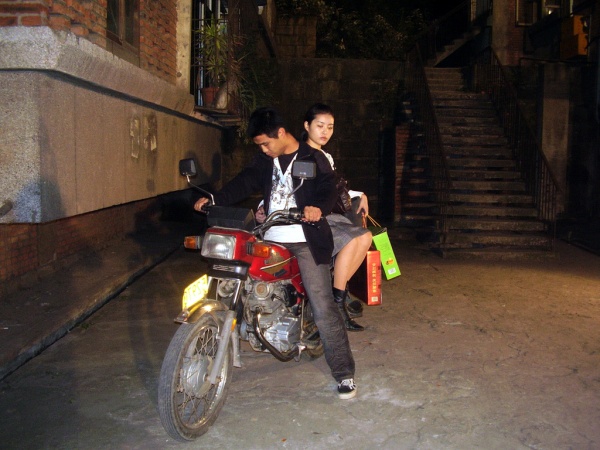
As attested by the remarkably choreographed festivities at the 2008 Beijing Olympics, the Chinese know how to party—and nothing was spared for the recent celebration of the People’s Republic of China 60th Anniversary party on October 1, with special attention paid to showcasing military strength. This momentous occasion marks the longest Communist party rule in history, and although the last 60 years have been met with much criticism and unease, and marked by intense economic, political, and cultural growing pains, China’s unique blend of communism and capitalism is undeniably large and here to stay. Chinese filmmakers (those both inside and outside of the border) are in a unique position to process and reflect their current cultural moment. Many different Chinese film programs around the world are running this fall to celebrate and recognize these filmmakers and this unique and important time in history, including our own film series, The People’s Republic of Cinema which runs November 4-23.
In the scheme of things, 60 years is a drop in the bucket for China’s immense history as one of the oldest civilizations on the planet, but the transformations the “New China” has undertaken are radical on a global scale. The process of modernizing an ancient culture coupled with an inflexible political climate, an environmental crisis, a growing consumerist culture, the tension between Eastern and Western values, a construction zone taking over every major city, and a new generation striving for individualism and creative freedom present enormous challenges.
I experienced this first hand in 2006 on a study trip through the School of the Art Institute of Chicago. Spending time with Beijing and Shanghai art students, hip-hop artists, and filmmakers allowed a privileged glimpse into the tensions they experience and make work about. I met some boys in Shanghai who strongly identified with American hip-hop and had started a group that traveled throughout southern China and rapped in Mandarin, Japanese, and English. (Most of the music they knew about had come through Japan, as the Japanese have an easier time finding American music and have been interested in hip-hop culture and paraphernalia for quite some time now.) The 021Crew, as they call themselves, recognize the challenges referenced in hip-hop music (the struggle for self-expression, distrust of government transparency, freedom, individualism, social and class distinctions, and the tension between generations) as parallel to their own. A few of them had studied abroad in Toronto and London, and were presented with new visions of China then the ones they had grown up with. None of them knew about the Tiananmen Square incident in 1989 (it is impossible to find information about this when in China, as it is a restricted online search), nor did they feel comfortable discussing it in public. In fact, after learning about it, they said, “That’s not my China!” And although they felt extreme pride in their country, they longed to experience different freedoms they felt were denied them. Through hip-hop they are able to express themselves and their ideas in ways they couldn’t otherwise. To them, it is a platform of revolution, but the difference is the prescribed action. As language and the written word are the embodiments of knowledge and the foundation of Chinese culture (traditionally, at least), I wonder if in some strange way Chinese hip-hop is an attempt to be a contemporary equivalent.
My Chinese painting professor who led the trip had grown up in a much different China. In fact, as a young boy he had left school to become part of the Red Guard and march all over southern China with other boys his age. The changes he has seen in his lifetime, although subjective and unique, chart the transformations (I struggle to use the word progress) many have experienced on a large scale.
Here is a list of some other festivals celebrating and recognizing the “New China,” and although there probably won’t be fireworks or choreographed parades, I hope you can make it out.
The People’s Republic of Cinema
Walker Art Center
Minneapolis, MN
November 4-23, 2009
http://calendar.walkerart.org/canopy.wac?id=5308
China Independent Film Festival
RCM Museum of Modern Art
Nanjing, China
October 12-16, 2009
http://www.chinaiff.org/html/EN/
LENS ON CHINA
Portland Art Museum Northwest Film Center
Portland, Oregon
September 24-November 5, 2009
http://www.nwfilm.org/screenings/21/207/#1379
NYFF Masterworks: (Re)Inventing China
A New Cinema for a New Society, 1949 – 1966
Film Society of Lincoln Center
New York City
September 26 – October 6, 2009
http://filmlinc.com/nyff/china.html
China Classic Film Festival
Confucius Institute, University of Wales Lampeter
Wales
October 1-31, 2009
http://www.chinaclassicfestival.com/
2009 Tokyo China Film Festival
Tokyo International Film Festival
Tokyo
October 18-25, 2009
http://www.tiff-jp.net/en/lineup/title_24.html
New Zealand Chinese Film Festival
New Zealand’s Pacific Culture and Arts Exchange Center
New Zealand
October 15- November 8, 2009
http://www.nzcta.co.nz/events/
FILMING EAST FESTIVAL
British Academy of Film and Television Arts
UK
October 3-31, 2009
www.bafta.org/whats-on/global-spotlight-china,828,BA.html
RAINDANCE FILM FESTIVAL
UK-China Film Association (UCFA)
London
October 3-10, 2009
http://www.raindance.co.uk/site/index.php?aid=3797
VISIBLE SECRETS: HONG KONG’S WOMEN FILMMAKERS
Cornerhouse
Manchester, England
October 9 -November 3, 2009
www.cornerhouse.org/visiblesecrets
______________________________________________________
Jesikah Ruehle bio:
+Loves being an intern in Film/Video at the Walker
+Graduated last year from the School of the Art Institute of Chicago with a BFA in Fiber and Material Studies and Film/Video
+Loves to ride her bike and experiment in the kitchen
+Is a hairstylist at FIVETWOSIX salon in St. Paul
+Some of her favorite filmmakers are Chris Marker, Shirin Neshat, Doug Aitken, and Stan Brakhage
+Is an escapist and consequently spends a lot of her free time looking up places to travel to
Get Walker Reader in your inbox. Sign up to receive first word about our original videos, commissioned essays, curatorial perspectives, and artist interviews.